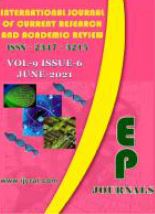Abstract Volume:9 Issue-6 Year-2021 Original Research Articles
 |
Online ISSN : 2347 - 3215 Issues : 12 per year Publisher : Excellent Publishers Email : editorijcret@gmail.com |
2Department of Agricultural Economics, Faculty of Resource and Economics Management, Shambu Campus, Wollega University, Shambu, Ethiopia
Objective: Coronavirus disease (Covid-19) is an infectious disease caused by a newly discovered coronavirus. This study was conducted to determine the level of KAP towards Covid-19 and identify associated factors among households in the Horro Guduru Wollega zone. Methods: A community-based cross-sectional study was employed to assess the KAP towards Covid-19 among the communities in the Horro Guduru Wollega zone. Data from the respondents were collected using interview techniques. Data collected contains knowledge, Attitude, and preventive practice addressing questions and socio-demographic characteristics. Descriptive statistics were used to set the KAP level and a logistic regression model was applied to test the association of KAP with various independent variables. Results: Of 634 total participants, 118(18.6%), 246(38.8%), and 463(73%) were identified as not knowledgeable, having a poor attitude, and poor practicing towards Covid-19 pandemic, respectively. In this study, place of residence, family income, and media access were identified as factors affecting KAP towards Covid-19. Both education and occupational status were affecting the knowledge and attitude level of participants towards the pandemic. Furthermore, this study identified that the knowledge level was affecting the attitude level, while attitude level was affecting the preventive practice towards the Covid-19 pandemic in the study area. Conclusion: Current study concludes that there was a gap in KAP towards Covid-19 among the participants in the study area. Thus, the concerned body should act on providing organized health education to the community, especially high attention must be given to the rural and low economic status communities through community-based behavioral change communication to assist and improve the level of knowledge, attitude, and preventive practice towards Covid-19 in the study area.
How to cite this article:
Agama Daba, Tamiru Yazew and Bacha Gebissa. 2021. Knowledge, Attitude and Preventive Practice (KAP) towards Covid-19 Pandemic among the Residents from Western Oromia, Ethiopia: Cross-Sectional Survey Study.Int.J.Curr.Res.Aca.Rev. 9(6): 56-68doi: https://doi.org/10.20546/ijcrar.2021.906.007



Quick Navigation
- Print Article
- Full Text PDF
- How to Cite this Article
- on Google
- on Google Scholor
- Citation Alert By Google Scholar
